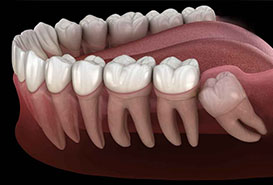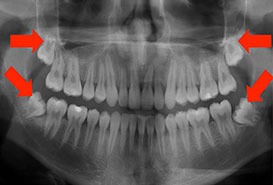Over time modern living and diet have changed the way humans evolve physically, including smaller jaw development and impacted wisdom teeth. Some people still develop wisdom teeth and others do not. Wisdom teeth may erupt causing dental disorders and impacted teeth, requiring their extraction.
Wisdom Teeth Impaction
With smaller jaw development the dental structure may not always facilitate wisdom teeth development due to lack of space. When a wisdom tooth erupts under such conditions it may develop irregularly or cause impaction.
Irregularly developed wisdom teeth or impacted wisdom teeth often cause gum or operculum swelling, inflammation, infection and pain in the mouth and jaw. Impacted wisdom teeth may also cause halitosis or bad breath. These symptoms are caused by bacterial colonisation as a result of wisdom tooth impaction.
Leaving impacted wisdom teeth untreated may cause oral disease and illness. It is therefore vital for good health and well-being that impacted wisdom teeth are removed through tooth extraction.


Wisdom Tooth Extraction
There are four main effects of wisdom teeth impaction requiring tooth extraction to preserve patient well-being. Wisdom teeth need to be extracted in cases of:
CavitiesWisdom tooth cavities result from tooth decay in the region of the wisdom tooth and affect neighbouring teeth. Food becomes trapped in the area of the irregular-developed wisdom tooth because it is difficult to clean. Excess oral bacteria colonises where plaque sticks to the trapped food, leading to the development of gum inflammation and infection. Extracting the wisdom tooth can prevent the spread of tooth decay to other dental structures.
CystsWisdom tooth cysts form from fluid and gas build-up in the infected bone around the impacted wisdom tooth. Cysts may grow and vary in size requiring enucleation and wisdom tooth extraction, so as to remove infection and prevent its spread in the body.
Gum DiseaseWisdom tooth gum disease results from an inability to properly clean the impacted wisdom tooth. Plaque and excess bacteria colonises the food debris trapped in the region of the wisdom tooth. If left untreated gum disease can then develop. To preserve oral and overall health and prevent further bone loss the wisdom tooth is extracted.
PericoronitisWisdom tooth pericoronitis is caused when the gum tissue or operculum overlapping the wisdom tooth becomes infected by colonising bacteria and plaque. The infection often re-occurs and results in the need for wisdom tooth extraction.
Wisdom Teeth Treatments-Leaving impacted wisdom teeth untreated may cause teeth and bone loss, which can drive up the cost of dental treatment, including emergency dental treatment for an impacted wisdom tooth. The need may also arise for medical treatment due to health complications as a consequence of untreated wisdom tooth impaction.Recommended treatments for wisdom teeth impaction will differ based on the type and severity of the impaction. One or more dental treatments may be required.
Wisdom Tooth Surgery and ProceduresPrior to wisdom tooth surgery the patient is administered local anaesthetic.
Weassesses patient response to the anaesthetic and begin the surgical procedure when the wisdom tooth region is numb for pain-free treatment. The surgeon lifts the gum tissue and lifts out the wisdom tooth.
Depending on the type and severity of wisdom tooth impaction, the surgical procedures may be somewhat different. For example, it may be necessary for us to remove wisdom tooth bone piece-by-piece to preserve surrounding dental structure.
Once the wisdom tooth is removed then we use self-dissolving stitches or Non-self dissolving stitches to re-seal gum tissue for healthy recovery. The entire surgery occurs within the mouth and does not affect the outer facial skin or structures.
Post Surgical ExperienceOnce the anaesthetic and sedation has worn off the patient may start to experience some discomfort. We may prescribe painkillers to alleviate any distress.
It is normal for individuals to experience some bleeding, swelling, pain and tenderness after wisdom tooth extraction. The facial muscles and jaw may feel sore, though these side-effects are short-term and will pass with healing. An antibiotic is prescribed to prevent infection and allow for healthy recovery.
Benefit of Wisdom Tooth ExtractingUnhealthy wisdom teeth are removed to eliminate spread of infection in the mouth to the rest of the body, where it would otherwise have the potential to trigger other health conditions, such as heart disease and diabetes.
Untreated wisdom teeth lead to bone loss, requiring missing tooth replacement so that dental function and facial volume is restored. More expensive dentistry treatments and cosmetic dentistry care may be required if an unhealthy wisdom tooth is left untreated.
